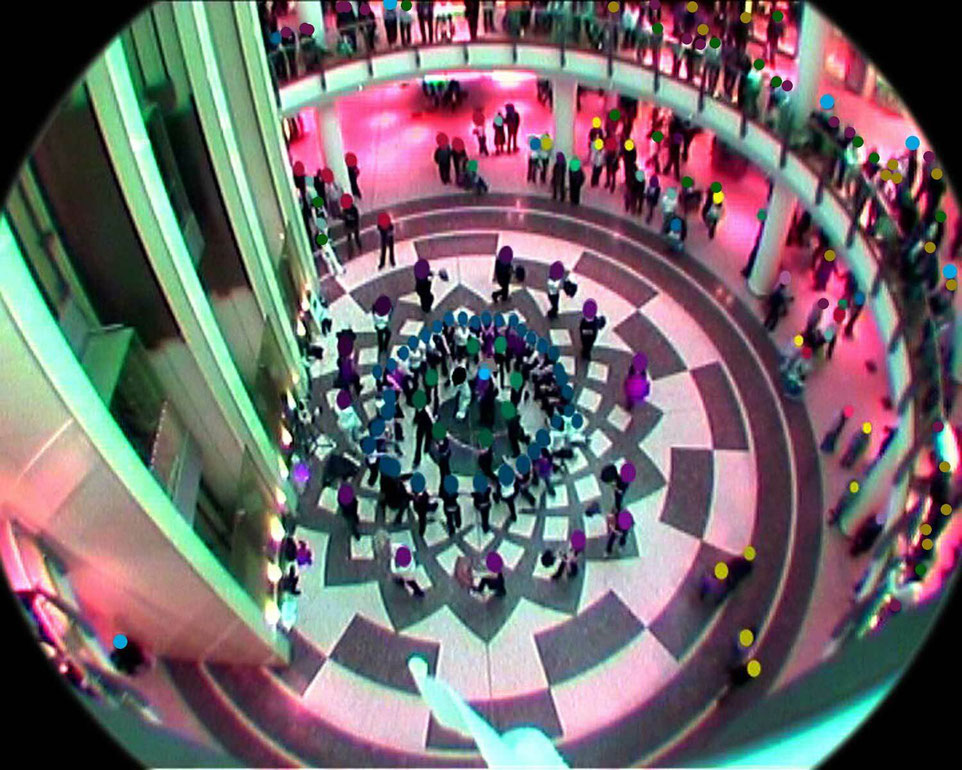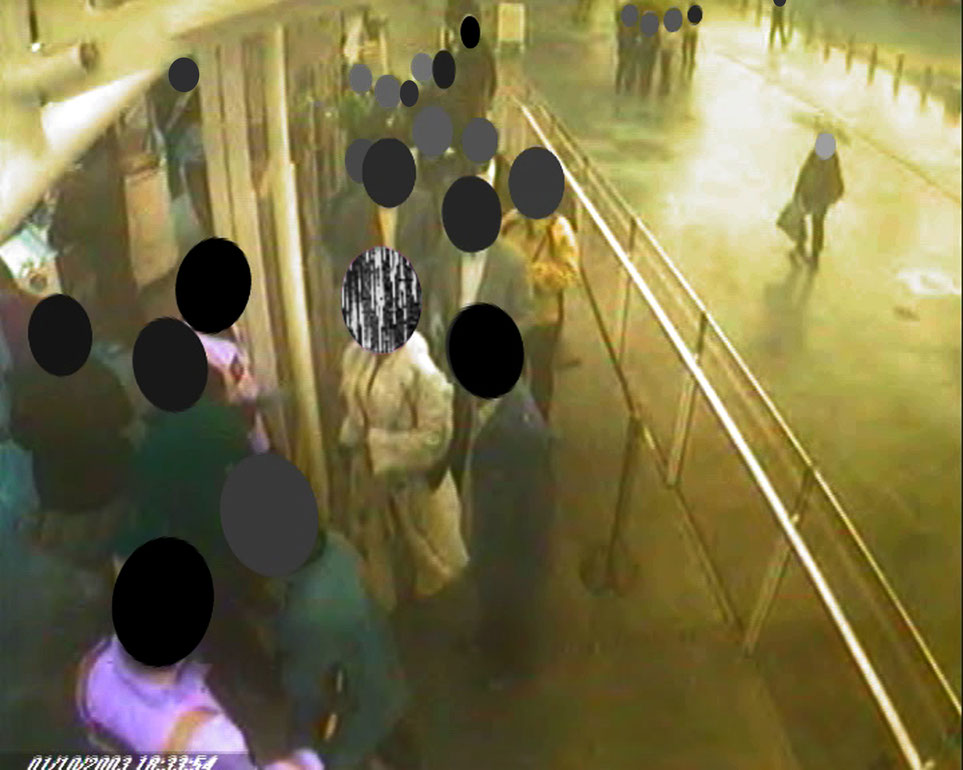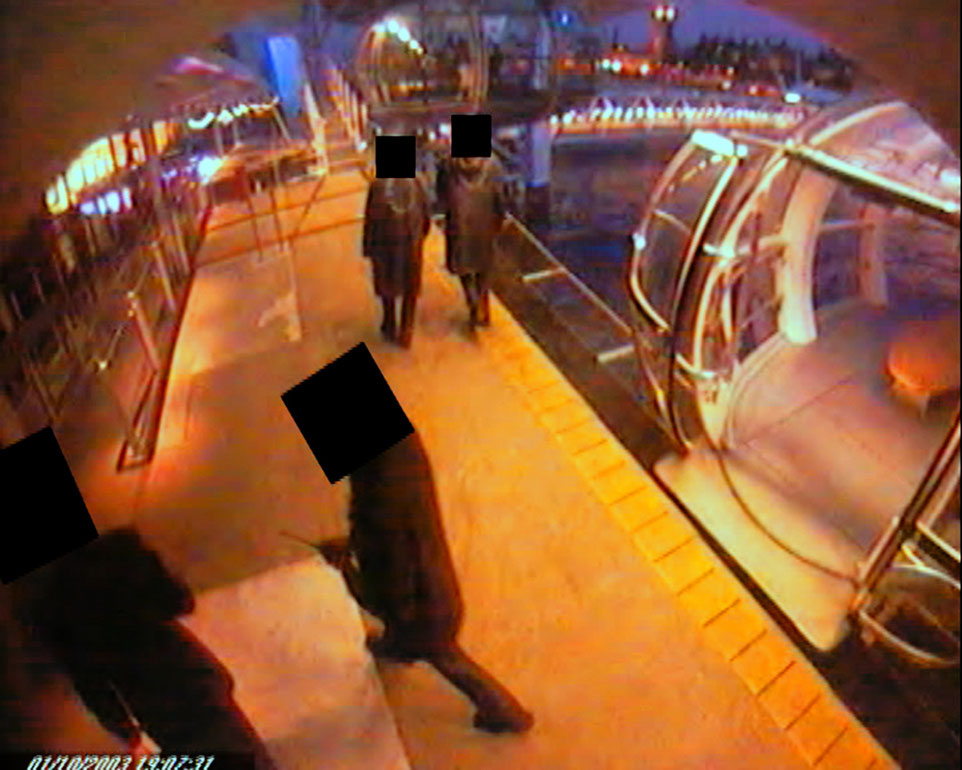Faceless
Images of Fear, against Fear
Fear blots out the present. It feeds on a past that spills over uncontrollably into the present; it takes possession of the future. Vanquishing this fear by eliminating past and future is the promise of the Big Brother state. This promise is contrived to legitimise the constant observation of public space, which turns the dream of a carefree existence in an isolated present into a nightmare reality.
Manu Luksch employs the vocabulary of science-fiction film to draw us into this nightmare. Crucially, she uses only images obtained from the operators of CCTV video-surveillance systems in London, under the terms of a British law governing access to data. In a fantastic and poetic concatenation, she transforms oppressively familiar views of the city into locations of a fateful scenario, in which a woman is thrust into a startling escape from the perpetually administered present of "Realtime".
Once as faceless and devoid of history as the other individuals anonymised in the recordings by the CCTV operators (to comply with privacy legislation), the film´s protagonist abruptly regains her face, and casts off her former existence as a bit of data to dive into her stolen past.
In a mirror image of the failed act of liberation that the trauma of this realization incites, Faceless succeeds in traumatising its viewers by means of an equally atmospheric and weirdly illuminated metanarrative - that of a society whose self-understanding is occluded by its dazzling media hyperpresence.
(Robert Buchschwenter)
Translation: Steve Wilder
In a society under the reformed "Real-Time" Calendar, without history nor future, everybody is faceless. A woman panics when she wakes up one day with a face. With the help of the Spectral Children she slowly finds out more about the lost power and history of the human face and begins the search for its future.
Faceless was produced under the rules of the "Manifesto for CCTV Filmmakers". The manifesto states, amongst other things, that additional cameras are not permitted at filming locations, as the omnipresent existing video surveillance (CCTV) is already in operation.
(production note)
"RealTime orients the life of every citizen. Eating, resting, going to work, getting married - every act is tied to RealTime. And every act leaves a trace of data - a footprint in the snow of noise..."
(excerpt of Faceless)
WATCH TRAILER
LOOK AT PRESS CLIPPINGS
FILM HOMEPAGE
Orwell´sche Filmparabel: "Faceless" von Manu Luksch im Wiener Top-Kino (Article)
"Faceless": Gesehen werden, ohne gelebt zu haben
Die österreichische Medienkünstlerin Manu Luksch hat nun einen Film realisiert, der zur Gänze auf das Bildermaterial aus ebendiesen Überwachungskameras zugreift. Ein Datenschutzgesetz nützend, das die Verwendung der Bilder erlaubt, die von einem selbst erstellt wurden, hat Luksch in Faceless sozusagen vor lauter fremden Augen inszeniert. Das eigentlich polizeiliche Material wird so auf originelle Weise zweckentfremdet.
Die Überwachungsaufnahmen, in denen über den Köpfen der Menschen kreisförmige Schwärzungen vorgenommen wurden (um die Identität Dritter zu schützen), sind in ihrer Erzählung Material eines totalitären Staates, der seine Bürger nicht nur permanent kontrolliert. Er beherrscht sie auch durch eine allumfassende Jetztzeit, die ihnen jedes Gefühl für Individualität genommen hat. Es ist dies die ein wenig redundante Variante einer Orwell´schen Zukunftsvision, die als Off-Kommentar in der glasklaren Sprache von Oscarpreisträgerin Tilda Swinton aber ihren Zweck gut erfüllt.
Faceless wird zur Geschichte der Erweckung einer Frau aus dem tiefen Schlaf der Anonymität. Seine Wirkung verdankt der Film allerdings vor allem den verschwommen pixeligen Bildern. Sie sperren sich zwar ein wenig gegen die Dramaturgie, entfalten aber eine eigentümliche melancholische Aura. Wenn aus interesselosen Fluchten nüchterner Wohnbauten oder dem Blick auf kopflos uniforme Menschen plötzlich ein Moment der Paranoia erwächst, dann ist der Film endlich bei sich selbst.
(Dominik Kamalzadeh, In: DER STANDARD/Printausgabe, 6.5.2008)
Faceless
2007
Austria, United Kingdom
50 min



